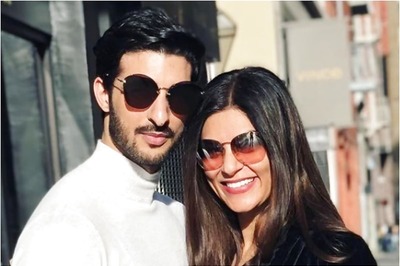
views
- Use “Mahal kita” to say “I love you” to partners, friends, or family. This is the simplest, most common way to say it.
- Say “Iniibig kita” as a more formal or dramatic way to say “I love you” to romantic partners. This is considered old-fashioned compared to “Mahal kita.”
- Reply with “Mahal din kita” to say “I love you too,” or “Hindi kita mahal” to say “I don’t love you.”
Saying “I Love You” in Tagalog

Say “Mahal kita” as the most common way to say “I love you” to anyone. There are multiple ways to say “I love you” in Tagalog (the Filipino language), but “Mahal kita” is the simplest, most common phrase in use today. Use this phrase when speaking to partners, friends, or family (however, keep in mind that many Tagalog speakers don’t use “I love you” as casually or jokingly as many English speakers). “Mahal” is pronounced as “mah-hall” and “kita” is pronounced as “kee-tah.” Variations of “Mahal kita” include: “Mahal na mahal kita” (“I love you very much”) “Mahal kita talaga” (“I really love you”) “Mahal kita magpakailanman” (“I love you forever”) “Lab kita!” (Taglish for “Luv ya!”)

Use “Iniibig kita” for a more poetic way to say “I love you” romantically. “Iniibig” comes from the verb “ibigin,” which means “to love someone romantically.” Therefore, use “iniibig kita” when speaking to your spouse or partner, and not to express friendly or familial love.
“Iniibig” is a 4-syllable word pronounced as “ee-nee-ee-beeg.”
This phrase is considered more dramatic than “Mahal kita” and is used sparingly.

Call someone “Mahal” (“love”) as a term of endearment. “Mahal” can also be used as a pet name or affectionate nickname for a partner or loved one (similar to calling someone “love,” “dear,” or “honey” in English). For example, “Mahal, can you help me carry in the groceries?” Other common pet names include: “Irog” (“Sweetheart” or “dear one”) “Sinta” (“Cherished one” or “true love” “Bi,” “bebe,” “bebe ko” (“Baby”) “Labs” (casual “love” or “luv”)

Experiment with other affectionate and romantic Tagalog phrases. Once you’re familiar with “Mahal kita” or “Iniibig kita,” try using more complicated phrases to express your love in different ways. Some common sayings include: “Miss kita” (“I miss you”) “May gusto ako sa iyo” (“I have a crush on you”) “Gusto kita” (“I like you”) “Gusto kitang makita” (“I want to see you”) “Iniisip kita” (“I’m thinking of you”) “Ikaw ang lahat sa akin” (“You are everything to me”) “Nakaka-inlove ka” (“You make me fall in love”) “In love ako sayo” (“I'm in love with you”) “Mag-ingat ka” (“Take care”)
Replying to “I Love You” in Tagalog

Say “Mahal din kita” to mean “I love you too.” This is a simple, easy way to respond to “Mahal kita” or another loving Tagalog phrase when you feel the same way. If you’re not in love with the person, try one of the following phrases: “Gusto kita ngunit hindi kita iniibig” (“I like you, but I don’t love you”) “Hindi kita mahal” (“I don’t love you”)
Pronunciation Tips

Practice Tagalog vowel pronunciation to sound out words phonetically. Unlike in English, there’s only one way to pronounce each vowel in Tagalog. This makes it much easier to sound out and pronounce new words syllable-by-syllable. Keep in mind that when two vowels occur next to each other (like in the word “iniibig”), each vowel is pronounced separately rather than combining to form a new sound (so “iniibig” would sound like “ee-nee-ee-beeg”). Here’s a breakdown of vowel pronunciation: A is pronounced as a straight “ah” sound (like in “father” or “mall”). E is pronounced as soft “eh” sound (like in “dress” or “echo”). I is pronounced as hard “ee” sound (like in the “e” in “evil” or the “y” in “happy”). O is pronounced as a straight and soft “oh” sound (like in “hello” or “rose”). U is pronounced as hard “oo” sound (like in “spoon” or “goose”).



















Comments
0 comment